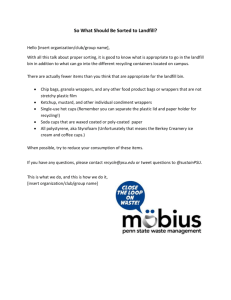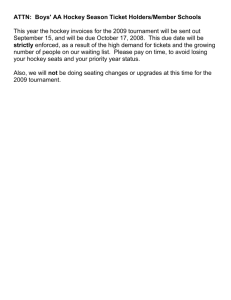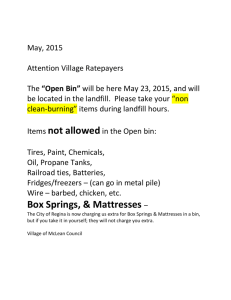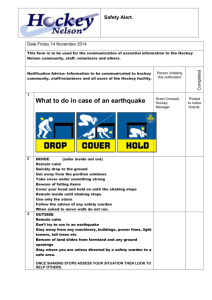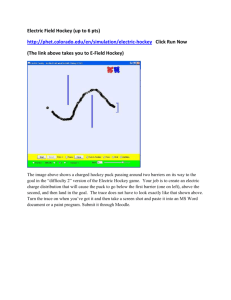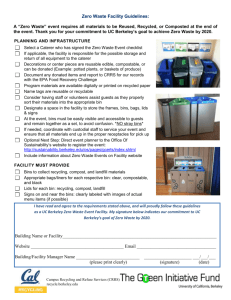Zero Waste Manager
advertisement
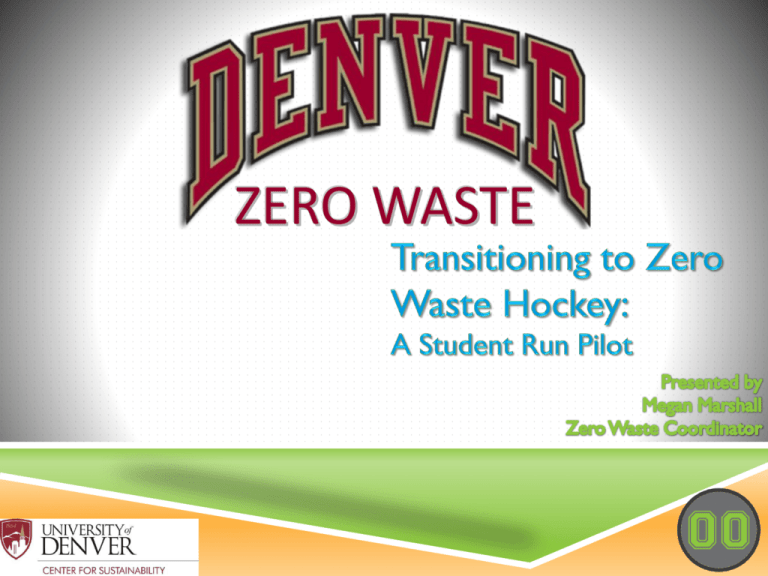
ZERO WASTE PRESENTATION OUTLINE Define Zero Waste Why are football & hockey different animals? The need for something new The start of our program The game process Hurdles we encountered Our results Plan for the season Our toolkit ZERO WASTE Zero Waste: defined as diverting 90% of waste either to recycling or composting facilities, with a maximum of 10% going to the landfill, strives to promote: waste minimization reduced consumption recycling and composting Sustainability and athletics are a natural fit due to its Competitive nature Reach wide variety of people Raise awareness Shows what sustainability can be WHY COLLEGE FOOTBALL & COLLEGE HOCKEY ARE COMPLETELY DIFFERENT ANIMALS Collegiate Football Collegiate Hockey Home Games: 6 Home Games: 23 Stadium Capacity: 25,000-115,109 seats Stadium Capacity: 750-17,200 seats Games in a Weekend: 1 Game Total Playtime: 11 minutes Games in a Weekend: 1-2 Game Total Playtime: 60 minutes THE NEED FOR SOMETHING NEW Magness Arena Hockey game capacity: 6,315 people Our Goal Multi-event arena Provide a model that is 23 hockey games last year Produces the largest amount of waste on campus Access to the largest array of people in one setting transferrable to any indoor arena sport basketball, volleyball, swimming, etc. WHERE WE STARTED & HOW IT WENT Program Goals 1. To learn about the existing systems 2. To implement incremental changes to divert more waste from the landfill Planning Volunteer recruitment Engaging stakeholders Defining the area Capture the waste from the concourse Realizing how little we knew/know It is a constant learning experience GAPS IN BEGINNING OUR PROGRAM Bin Placement Too many stations High contamination rates Products Inconsistent Landfill items Education & Fan Engagement Engagement with Select Stakeholders Telling Our Story Game Day Process 2 hrs Pre-Game 1 hr Pre-Game Game Start 1 hr Post 2 hr Post After Game Train Concessions Check Products & BOH Check Bin Parity Train volunteers place at stations Weigh back of house & Club level throughout game Check on volunteers Train Bowl Pick Weigh BOH, Club, Concourse, BP Collect shirts/feedback Check-in give T-shirts Sodexo Custodial Volunteers HURDLE: HIGH CONTAMINATION RATE CHALLENGE: Stand-alone bins & high number of bins In the concourse created contaminated bins Difficult to man Confused fans SOLUTION: Reduced # of bins accessible to fans in the concourse Outlawed stand-alone bins for 2013-2014 season Added bin caddies to condiment carts Instituted color coded signage and bag liners Increased goalie participation HURDLES: PRODUCT INCONSISTENCY CHALLENGE: 11 different cups used for beverages alone Too many landfill items Each game it was a surprise SOLUTION: Hide bad products (Shhhh) Ran low on stock purchased sustainable items Created purchasing guidelines Collaborated with main campus to use some of the products PLAN FOR THE YEAR 75% diversion rate for the hockey season Include bowl pick and back of house waste in measurements Train all stakeholder staff of zero waste operations and best practices Product consistency & alignment Improve waste flow to increase the overall diversion rate. TOOL KIT: WASTE DISPOSAL PLAN Create complete bin parity in zero waste zone Consistent/color-coded labeling & color-coded bags Clearly outlined collection for each arena of the arena Create a map finalizing bin placement, concession stand placement, etc. TOOL KIT: DISPOSABLE PRODUCT PURCHASING GUIDELINES Work with food service provider to streamline products to create a more consistent disposal method Clearly recycling (Blue) Recyclable concession drink cups & franchise clear cups Compost: Food & Fiber (Green) Food products, ware, paper/wood products, and hot cups TOOL KIT: COMPREHENSIVE & TRAINING Make sure all stakeholders are trained and aware of zero waste operations Ushers Athletics Food Service Custodial Bowl Pick Staff Volunteers Create training materials Back of house signage Volunteer training boards TOOL KIT: SHARE DATA Breakdown the data into a format that fits the needs of the stakeholders by producing a game day report Volunteer measurement # of volunteers # of returning volunteers Volunteer satisfaction/feedback Stakeholder feedback Waste data Breakdown by collection location/location type Contamination rates if possible Calculate a diversion rate broken down into waste streams Chart your data Write a narrative after each game TOOL KIT: SET ZERO WASTE GOALS, ACTION ITEMS, & DEADLINES Set a season diversion rate goal Interterm goals Set a goal for volunteer recruitment Season budget/funding Create a responsibilities table for all stakeholders to be accountable Chart action items into a timeline QUESTIONS? Megan Marshall Zero Waste Manager Center for Sustainability 303.717.3957 Megan.marshal@du.edu
